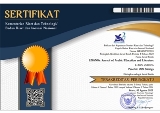Burial in the Homeland as the Highest Dreams of the Exiles: Postcolonialism in the Modern Arabic Novel
DOI:
https://doi.org/10.18326/lisania.v8i2.170-187Keywords:
Burial, Postcolonialism, Testament, Exile, Modern Arabic NovelAbstract
This research aims to show the strategy adopted by Arab exiles in modern Arabic novels to return to their homeland by making a testament for repatriating their bodies after they die. Considering that the phenomenon of the outcasts is an effect of Western colonialism in the Arab world, this research uses a postcolonial perspective to approach the topic. Using an interpretive method, the exiles' desire to be buried in the homeland will be examined in three novels: Lailatu al-Milyār (1986), Sahrah Tanakkuriyyah lil-Mautā (2003) by Gādah as-Sammān (Syrian Lebanese), and Maṣā`ir: Kūnsyirtū al-Hūlūkūst wa an-Nakbah (2015) by Raba’ī al-Madhūn (Palestinian). The results of the analysis show that: (1) exiles made testament to their offspring to be buried in the homeland to ensure the connection, (2) socio-economic conditions in exile and socio-politics in the homeland make the testament failed to be realized, (3) the effects of inability to fulfill the testament had become a way for the offspring to get to know and love the homeland despite of the distance. Even though returning to the homeland is proved impossible, this strategy of exiles had succeeded in raising nationalism in their offspring. The futility of returning to Palestine seems greater than to Lebanon, considering that Israel has occupied Palestine.
References
Abul-‘Azm, Ṭ. A. al-‘A. (2015). Adab mā baʿdal-Istiʿmār wa Naẓariyyatuhul-Naqdiyyah. ʻAin lil-Dirāsāt wal-Buḥūṡil-Insāniyyah wal-Ijtimāʿiyyah.
Allen, R. (2003). An Introduction to Arabic Literature. Cambridge University Press.
Alsaleh, A. (2019). Mourid Barghouti's I Saw Ramallah: The Impossible Return of the Displaced Autobiographer. Humanities, 8(2), 69.
Anderson, B. (2006). Imagined Communities Reflections on the Origin and Spread Nationalism. Verso.
Ashcroft, B., Gareth G., & Helen T. (1946). Post-colonial studies: Key Concepts. Routledge.
______________________________________. (1995). The Post-colonial Studies Reader. Routledge.
Badawi, M. M. (1992). Modern Arabic Literature. University of Cambridge.
Batt, S.I, and Sharma, Nupur. (2020). Cultural intersection is a study of diasporic Arab women's writing. International Journal of Advanced Academic Studies. 2(4),352-360
Burns, Lorna & Kaiser, M. (Eds.). (2012). Postcolonial Literatures and Deleuze Colonial Pasts, Differential Futures. Palgrave Mcmillan.
Collelo, Thomas. (1989). Lebanon, a Country Study. Washington, D.C: The Division.
Endraswara, S. (2013). Metode Penelitian Sastra. Media Pressindo.
Foster, Leila Merrel. (1992). Enchantment of the world Lebanon. Chicago: Children Press
Foulcher, K, & Day, T. (2002). Clearing A Space, Sastra Indonesia Modern: Kritik Postkolonial. KITLV dan Yayasan Obor Indonesia.
Günther, S. & Milich, S. (2016). Representations and Visions of Homeland in Modern Arabic Literature. Olms Verlag.
Haidar, M. (2018). Naḥnu wa Azmah al-Isti‘māriyyah. Naqdu al-Mabānī al-Ma‘rafiyyah li al-Kulūniyyah wa mā-ba’da al-Kulūniyyah. Markazu al-Fahrasati wa Naẓamu al-Ma’lūmati.
Hout, S. C. (2005). Memory, Home, and Exile in Contemporary Anglophone Lebanese Fiction. Critique: Studies in Contemporary Fiction, 46(3), 219‒233. https://doi.org/10.3200/CRIT.46.3.219-233.
_____________. (2006). The Predicament of in-betweenness in the Contemporary Lebanese Exilic Novel in English. In Suleiman, Y. & Muhawi, I. (Eds.). Literature and Nation in the Middle East. Edinburgh University Press.
Humprey, M. (2004). Lebanese Identities: Between Cities, Nations, and Trans-nation. Arab Studies Quarterly, 26(1), 31‒50. http://www.jstor.org/stable/41858471.
Al-Madhun, R. (2015). Maṣā`ir: Kunsyirtū al-Hūlūkūst wa an-Nakbah. Al-Fikr al-Jadid.
Al-Maleh, L. (2009). Arab Voices in Diaspora: Critical Perspectives on Anglophone Arab Literature. Rodopi.
Marroum, M. (2008). What's So Great About Home? Roots, Nostalgia, and Return in Andree Chedid's La Maison Sans Racines and Hanan al-Shaykh's Hikāyat Zahrah. Comparative Literature Studies, 45(4), 491‒513.
Masood, K.M. (2022). Palestinian Literature: A Chronicle of Permanent Exile and Setbacks. Rihan Journal for Scientific Publishing. Issue 26. P. 264-298.
Mohammad, G. A, and Abdulaali, W. A. (2020). Mahmoud Darwish and Tanure Ojaide: Poets of exilic consciousness and representatives of oppressed nations. Art and Humanities 14(1) P. 41-53.
Al-Musawi, M. J. (2019). Writing in Exile: Which Sense of Be-Longing?. ESC: English Studies in Canada, 27, 481‒507.
_________________. (2003). The Postcolonial Arabic Novel: Debating Ambivalence. Brill.
Ratna, N. K. (2004). Teori, Metode, dan Teknik Penelitian Sastra. Pustaka Pelajar.
Rushdie, S. (1991). Imaginary Homelands: 1981‒1990 Essays and Criticism. Penguin Books/Granta.
Sabit, Tariq. (2014). Hawiyyatu al-Adabi baina al-Huḍūri wa al-Giyābi fī al-Khiṭābi an-Naqdiyyi al-‘Arabiyyi mā ba’da al-Isti’māri. Al-Aṡr, 13(21), 103‒112. https://search.emarefa.net/detail/BIM-410195.
Al-Saffar, R. (2015). New Forms of Exile: Arab Identity in Three Contemporary Novels. AUC Knowledge Fountain. https://fount.aucegypt.edu/etds/71.
Safran, W. (1991). Diasporas in Modern Societies: Myths of Homeland and Return. Diaspora: A Journal of Transnational Studies, 1(1), 83–99. https://doi:10.1353/dsp.1991.0004.
Said, E. W. (2000). Reflections on Exile and Other Essays. Harvard University Press.
as-Sammān, G. (1986). Lailatu al-Milyār. Mansyurat Gādah as-Sammān.
________________. (2003). Sahrah Tanakkuriyyah lil-Mautā. Mansyurat Gādah as-Sammān.
Sellman, J. (2018). A Global Postcolonial: Contemporary Arabic Literature of Migration to Europe. Journal of Postcolonial Writing, 54(6), 751–765. https://doi.org/10.1080/17449855.2018.1555207.
Setiawati, S.M. (2017). Mekanisme Consociational dalam Penyelesaian Konflik Internal Lebanon. Yogyakarta: Elmatera Publishing.
Spirit of Aqsa. (2024). Hamas: Taufan al-Aqsa Kembalikan Israel ke Titik Nol. accessed from https://spiritofaqsa.or.id/hamas-taufan-al-aqsa-kembalikan-israel-ke-titik-nol.html in November 21st, 2024.
Suleiman, Y. & Muhawi, I. (2006). Literature and Nation in the Middle East. Edinburgh University Press.
Tristina, Merta. (2024). ICJ Putuskan Pendudukan Israel di Palestina Ilegal dan Harus Diakhiri. accessed from https://www.cnbcindonesia.com/news/20240720094208-8-556245/icj-putuskan-pendudukan-israel-di-palestina-ilegal-harus-diakhiri in November 21st, 2024.
Downloads
Published
Issue
Section
License
Copyright (c) 2024 Mahmudah, Amina Tahraoui

This work is licensed under a Creative Commons Attribution-NonCommercial-ShareAlike 4.0 International License.






